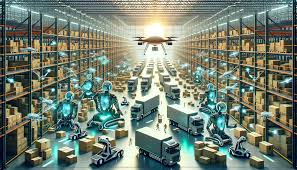In the fast-paced world of business, logistics plays a critical role in ensuring that products are delivered efficiently and cost-effectively. As companies strive to enhance their supply chain operations and meet growing consumer demands, artificial intelligence (AI) has emerged as a transformative force. By leveraging AI technologies, businesses can streamline their logistics processes, reduce costs, and improve overall efficiency. Here’s how AI is reshaping logistics and supply chain management.

Table of Contents
Toggle1. Demand Forecasting
Accurate demand forecasting is essential for effective logistics planning. AI can analyze historical sales data, market trends, and external factors (such as seasonal fluctuations or economic indicators) to predict future demand. This enables businesses to optimize inventory levels, reduce excess stock, and minimize stockouts.
Example: Retailers can use AI-driven demand forecasting tools to analyze purchasing patterns, allowing them to adjust inventory levels in anticipation of seasonal demand shifts.
2. Route Optimization
AI algorithms can analyze various factors, such as traffic patterns, weather conditions, and delivery windows, to determine the most efficient routes for transportation. This not only reduces delivery times but also cuts fuel costs and minimizes carbon emissions.
Example: Logistics companies can use AI-powered routing software to optimize delivery routes in real-time, ensuring that drivers take the most efficient paths to their destinations.
3. Warehouse Management
AI can enhance warehouse management by automating processes such as inventory tracking, order picking, and stock replenishment. Robotics and AI systems can work together to optimize warehouse operations, improving accuracy and reducing labor costs.
Example: Automated guided vehicles (AGVs) equipped with AI can navigate warehouses, transporting goods from one location to another, streamlining the order fulfillment process.
4. Predictive Maintenance
AI can analyze data from machinery and equipment to predict when maintenance is needed, reducing the risk of unexpected breakdowns. This proactive approach to maintenance can minimize downtime and keep logistics operations running smoothly.
Example: AI sensors can monitor the condition of delivery trucks, alerting logistics managers when maintenance is required, thus preventing costly disruptions.
5. Inventory Management
AI-driven inventory management systems can provide real-time insights into stock levels, turnover rates, and demand patterns. This helps businesses make informed decisions about restocking and inventory allocation, ensuring optimal inventory levels.
Example: AI can analyze historical sales data to recommend when to reorder products, minimizing the risk of overstocking or stockouts.
6. Enhanced Visibility and Tracking
AI can improve visibility across the supply chain by providing real-time tracking of shipments and inventory. This transparency enables businesses to respond quickly to any disruptions or delays, enhancing customer satisfaction.
Example: AI-powered logistics platforms can offer customers real-time updates on their shipments, improving communication and trust.
7. Cost Reduction
By optimizing various aspects of logistics—such as transportation, warehousing, and inventory management—AI can significantly reduce operational costs. This enables businesses to allocate resources more efficiently and enhance profitability.
Example: AI algorithms can analyze shipping data to identify cost-saving opportunities, such as consolidating shipments or renegotiating carrier contracts.
8. Supplier Selection and Management
AI can assist businesses in evaluating and selecting suppliers based on performance metrics, pricing, and reliability. By analyzing historical data, AI can help identify the best suppliers, ensuring consistent quality and delivery times.
Example: AI-driven analytics can assess supplier performance, allowing businesses to make data-driven decisions about supplier relationships.
9. Customer Experience Enhancement
AI can help improve the customer experience by ensuring timely deliveries and accurate order tracking. Enhanced logistics operations lead to higher customer satisfaction, which is essential for repeat business.
Example: AI chatbots can provide customers with real-time updates on their orders and address any inquiries, enhancing communication and trust.
10. Scalability and Flexibility
As businesses grow, their logistics needs can change rapidly. AI solutions can scale with the business, adapting to new requirements and optimizing logistics processes accordingly. This flexibility ensures that businesses can respond to changes in demand without sacrificing efficiency.
Example: AI logistics platforms can adjust to fluctuating order volumes, optimizing processes to maintain efficiency during peak seasons or growth periods.
Conclusion
AI is revolutionizing logistics by streamlining processes, improving efficiency, and reducing costs. From demand forecasting and route optimization to inventory management and predictive maintenance, AI technologies are enabling businesses to enhance their logistics operations. By leveraging AI, companies can achieve greater visibility, flexibility, and responsiveness in their supply chains, ultimately driving customer satisfaction and business growth. As the logistics landscape continues to evolve, embracing AI will be crucial for businesses looking to stay competitive in a dynamic marketplace.


No responses yet